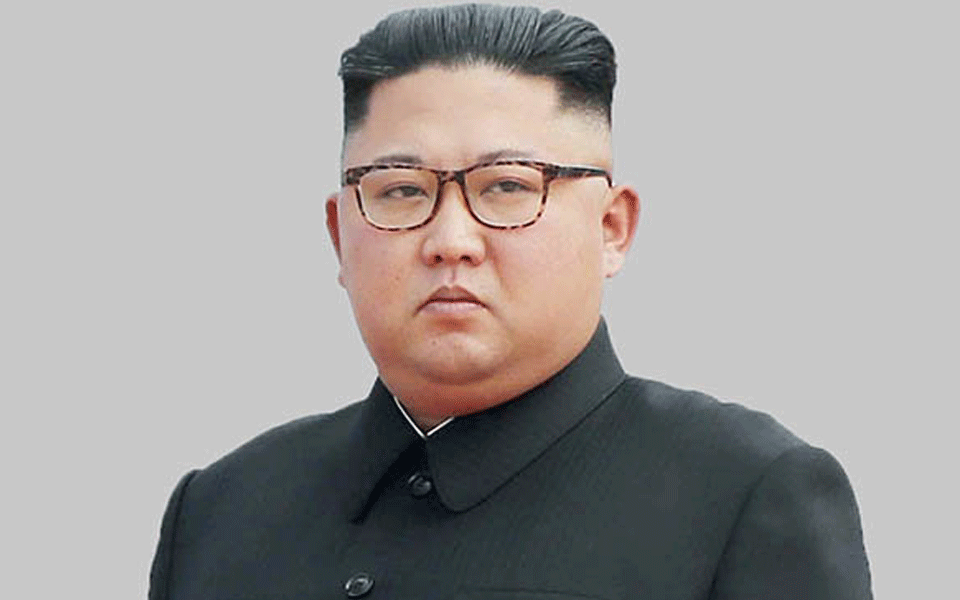Seoul: North Korea launched unidentified projectiles into the sea Saturday, the South Korean military said, in what could be Pyongyang's first short-range missile launch for more than a year as it seeks to up pressure on Washington with nuclear talks deadlocked.
The United States and North Korea have been at loggerheads since the collapse of a summit between Kim Jong Un and Donald Trump in February, where the two sides clashed over sanctions and the extent of Pyongyang's concessions on its atomic arsenal.
North Korea "fired a number of short-range projectiles from its Hodo peninsula near the east coast town of Wonsan to the northeastern direction from 9:06 am (0006 GMT) to 09:27 am today", the South's Joint Chiefs of Staff said in a statement.
The projectiles travelled from 70 to 200 kilometres (45 to 125 miles) towards the East Sea, also known as the Sea of Japan, the JCS added.
In an earlier statement, it had said Pyongyang had launched an unidentified short-range missile. The last North Korean missile launch was in November 2017.
The latest firing comes just a day after South Korean Foreign Minister Kang Kyung-wha said Pyongyang should show "visible, concrete and substantial" denuclearisation action if it wants sanctions relief.
That issue was also at the centre of the February talks in Hanoi, where North Korea demanded immediate sanctions relief, but the two sides disagreed on what Pyongyang should give up in return.
Earlier this week, North Korean Vice Foreign Minister Choe Son Hui warned Washington of an "unwanted outcome" if it did not adjust its stance on economic sanctions.
North Korea did not carry out any missile or nuclear tests last year, as Kim held his first historic summits with the leaders of the United States and South Korea.
Saturday's launch "does not violate Kim Jong Un's self-imposed missile-testing moratorium", which "only applied to intercontinental-range ballistic missiles", said North Korea analyst Ankit Panda.
"North Korea historically did not generally test anything while talks were on with the US. Talks are not on." The White House said it was "aware of North Korea's actions tonight". "We will continue to monitor as necessary," Press Secretary Sarah Sanders said in a statement.
Japan, meanwhile, said there was "no confirmation of ballistic missiles" entering its territory.
"At this point, there is no confirmation of any situation that may impact our national security," the Japanese defence ministry said in a statement.
Hodo Peninsula, where Saturday's firing took place, has been used as a training area for "live-fire testing, training exercises for artillery and coastal defence cruise missiles" since the 1960s, according to the respected 38 North website.
It wasn't until the mid-1990s that a "formal training area" was established in the region, and Hodo has been "increasingly used for ballistic missile and long-range artillery rocket testing" during the last 10 years, it added.
Since the collapse of the Hanoi summit between Kim and Trump in February, South Korean president Moon Jae-in -- who brokered the first meeting between the mercurial leaders -- has tried to salvage diplomacy, but Pyongyang has remained largely unresponsive.
Kim slammed the South in a speech to his country's rubber-stamp legislature last month, saying it should not "pose as a meddlesome 'mediator'" between the US and Pyongyang.
Last week, on the anniversary of the Panmunjom summit, Pyongyang's state media KCNA said Washington and Seoul "keep pushing the situation of the Korean peninsula and the region to an undesirable phase", criticising their joint military exercises.
"Chairman Kim has decided to remind the world -- and specifically the United States -- that his weapons capabilities are growing by the day," said Harry J Kazianis, Director of Korean Studies at the Center for the National Interest.
"My fear is that we are at the beginning stages of a slide back to the days of nuclear war threats and personal insults, a dangerous cycle of spiking tensions that must be avoided at all costs."
Let the Truth be known. If you read VB and like VB, please be a VB Supporter and Help us deliver the Truth to one and all.
Dubai: Smoke was seen rising from an area near the United States Consulate in Dubai, according to witness accounts cited by Reuters.
There was no immediate official confirmation on the extent of damage or whether there were any casualties in the incident.
Earlier, the US embassy in Riyadh, Saudi Arabia’s capital, was also attacked. Authorities reported damage to the premises, but no casualties were recorded.
The developments come amid heightened tensions in the region, with Iran continuing to target US interests in the Middle East following deadly attacks launched on Saturday by Israel and the United States.
Near US embassy in Dubai pic.twitter.com/z5VTZNVxNO
— Sahil Shah (@thesahilsshah) March 3, 2026





